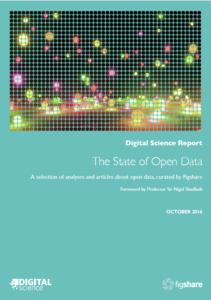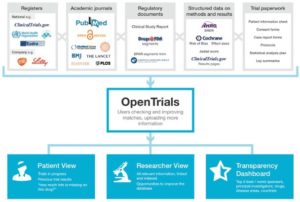
Making research more accessible with Figshare
In December we announced that we are now depositing more than 300 BioMed Central and SpringerOpen journals in Figshare in order to promote wider access to research data. Amongst other benefits, this will provide each journal with its own portal within Springer Nature’s Figshare repository, giving each j ournal its own data repository. In this blog, Head of Data Publishing at Springer Nature, Iain Hrynaszkiewicz, gives us the full details on this exciting open data announcement.
ournal its own data repository. In this blog, Head of Data Publishing at Springer Nature, Iain Hrynaszkiewicz, gives us the full details on this exciting open data announcement.
In February we provided an update that more than 450 BioMed Central and SpringerOpen journals had been integrated with Figshare meaning that more than 19,000 articles now have their supplementary materials stored in Figshare.
Publishing better science through better data 2016
Last year Scientific Data and Springer Nature partnered with Wellcome Trust to host a conference aimed at early career researchers that focused on good practice for data management, collection and presentation. Presentations at the conference also highlighted tools and resources available to researchers to help them and society derive maximum benefit from research data.
Speaking at the conference, Iain Hrynaszkiewicz, highlighted Open Access Week and its 2016 theme: Open in action, making a point that this was also the theme of the conference: “bridging the gap between policies on research data sharing and research data management and what they actually mean in practice for researchers whether in the lab or field or clinic”.
https://www.youtube.com/watch?v=3USEGwgVu_0&list=PLwn5E2MzmVwWqLrN70gpSrTQYb8KEZDfs&index=1
You can watch a playlist of recordings from the conference here.
 The State of Open Data: Report Provides New Insights into the Global State of Open Data #stateofopendata
The State of Open Data: Report Provides New Insights into the Global State of Open Data #stateofopendata
During Open Access week 2016, Figshare released the results of its global survey of 2,000 researchers in a report that assessed the global landscape around global data.
Some of the key findings were that for many, open data is already a reality: around three quarters of those surveyed had made research data openly available at some point. The report also found that 80% of researchers value data citation as much as, or more than article citation. You can read more of these findings and access the full report via the blog.
European open access strategies
 As part of our coverage for Open Access Week we invited Research and Development Manager of the Springer Nature Open Research Group, Jess Monaghan, to investigate open access policies throughout Europe. She compares the varying strategies and open access policies of individual countries and looks at where biggest developments are being made.
As part of our coverage for Open Access Week we invited Research and Development Manager of the Springer Nature Open Research Group, Jess Monaghan, to investigate open access policies throughout Europe. She compares the varying strategies and open access policies of individual countries and looks at where biggest developments are being made.
Promoting research data sharing at Springer Nature
Last year Springer Nature introduced a set of standardized research data policies with the aim of having the most comprehensive and inclusive research data policy of any large publisher. These policies will enable our authors to publish the best research and maximize the benefit of research funding. One of the key aims of these standardized research data policies is to encourage publication of more open and reproducible research.
https://www.youtube.com/watch?v=UtETETK5CQo
OpenTrials: what, why and how?
 Last year Ben Goldacre and Jonathan Gray published an article in Trials that introduced a new project called OpenTrials. In this guest blog, Ben Goldacre explains that OpenTrials is an open, freely accessible index of all publicly accessible documents and data ever made available, on all clinical trials ever conducted.
Last year Ben Goldacre and Jonathan Gray published an article in Trials that introduced a new project called OpenTrials. In this guest blog, Ben Goldacre explains that OpenTrials is an open, freely accessible index of all publicly accessible documents and data ever made available, on all clinical trials ever conducted.
In the blog Ben explores the messy world of clinical trials and explains why a freely accessible database of all publicly accessible data on trials is so important.
Comments